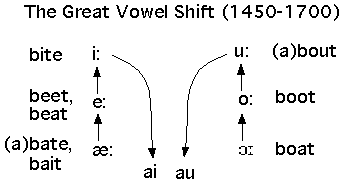I’ve been fascinated with linguistics since I took a historical linguistics course while at the Russian School in Monterey back in the dark ages, taught at Monterey Peninsula College by a teacher from the Bulgarian department, if I remember right. Germanic linguistics, in particular. He was a phonetician, so the course was all about such things as

and Grimm's Law and Verner's Law, aka "The Great (first and second) Germanic Consonantal Sound Shifts." I realize this is a seriously esoteric subject to most people, but I love it that you can go down the list and find where the cousin languages English and German parted ways in dozens of places. The distribution of p and f and pf, for example: English apple, German Apfel; English pepper, German Pfeffer. And in Danish it's æble and peber.
That puts the snuff/Schnuppe contrast in context. And while we’re at it, what’s not to love about the German word for meteor or falling star? Star is Stern and falling star is Sternschnuppe. That’s why I was looking up the word Schnuppe. I was reading about a kindergarten in Bremen called the Sternschnuppe Kindergarten.
The German way of saying “to take a walk” is “einen Spaziergang machen” (literally, to do a “promenade – going.”) When Taku and I take the girls out for a walk, we call it a Schnüffelgang, schnüffeln being the German word for sniff, since the girls have to stop to smell every blade of grass between here and France. (I could also call it a Schnuppergang.)
So not only do German words in f or pf line up against English words in p, but German words in “sh” (written “sch” in German, or s before t and p) line up with English words in “s”. English “Apple Strudel” is German “Apfelstrudel” where the strudel part is pronounced “shtroodle.” Not only is English sniff German schnüffeln, but English snout is German Schnauze and English snap is German schnappen.
Ablauting is the linguistic term for that way Germanic languages have of alternating vowels within a semantic category. We do it with tenses, in German and English (and other Germanic languages as well). English “spring-sprang-sprung,” is German “springen-sprangen-gesprungen,” and “sing-sang-sung“ is „singen-sangen-gesungen.“ (My computer is beginning to scare the bejeezus out of me – how did it know to switch the open quotes from the top of the line, the way we write them in English to the bottom of the line, as we write them in German? I feel a paranoia coming on.)
The English verb to sniff is a “weak” verb, i.e., it doesn’t ablaut, but has the principle parts: sniff, sniffed, sniffed. But when you cross the line into German, to sniff is not only schnüffeln, but schniefen. You might say sniff is to use the nose to smell something delicately, while snuffle is to do the same thing noisily, but people often blur this distinction in actual usage. But then, sniffle means to breathe through a snotty nose, like when you’re crying, and snivel means to make whiny noises when you’re crying, drawing a distinction between cute, you might say, and obnoxious. But both these words, sniffle and snivel – and sniff, as well, are translated by the German word schniefen. Gets complicated.
Then there’s this grated black tobacco people used to sniff through their noses called snuff. Not to be confused with the burned-out candle wick snuff. You can see the connection there between sniff and snuff, of course. German for to snuff or to take snuff, incidentally, is schnupfen, schnuppern, or schüffeln – take your pick.) The word snuff has since been extended into the English idiom, “not up to snuff,” meaning not up to standards or expectations. And to the German idiom “Es ist mir schnuppe,” meaning “it’s all the same to me (stronger, actually; more like “I couldn’t give a good hot damn.”) English has also pressed the word into the service of “to do somebody in” – as in snuff films – films of people being murdered. And there’s also the British slang expression, to snuff it for which Americans use the terms to croak, to kick the bucket or to bite the dust. But that's enough about ablauting and such for the time being.
Time, once again, for breakfast.
Which makes me think of that insightful observation that there's no difference between being young and being old except that when you're old breakfast comes every fifteen minutes.
No comments:
Post a Comment